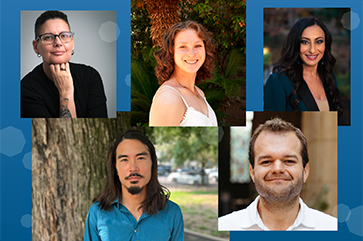Bruins building a better world, one day at a time
These five College alumni are setting an inspiring example for us all
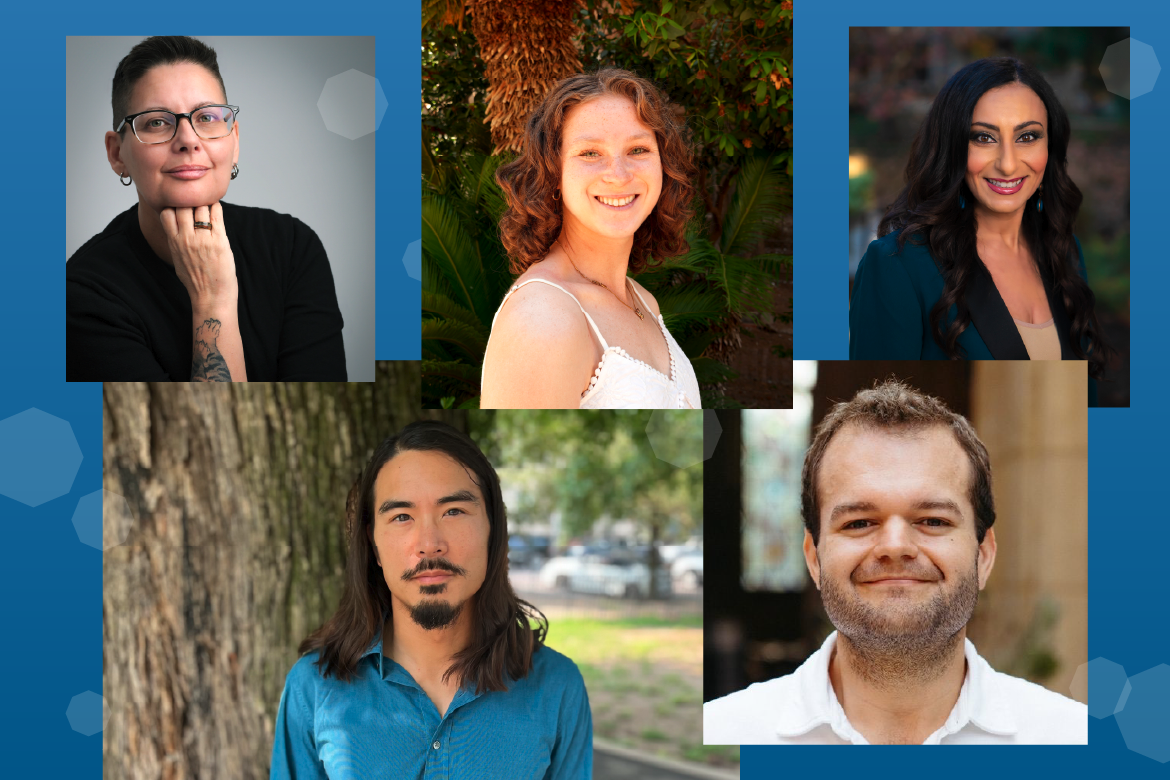
Caro De Robertis by Irene Young; composite by Katie Sipek/UCLA
Michael Agresta | October 27, 2025
Neil Gong M.A. ’13, Ph.D. ’19
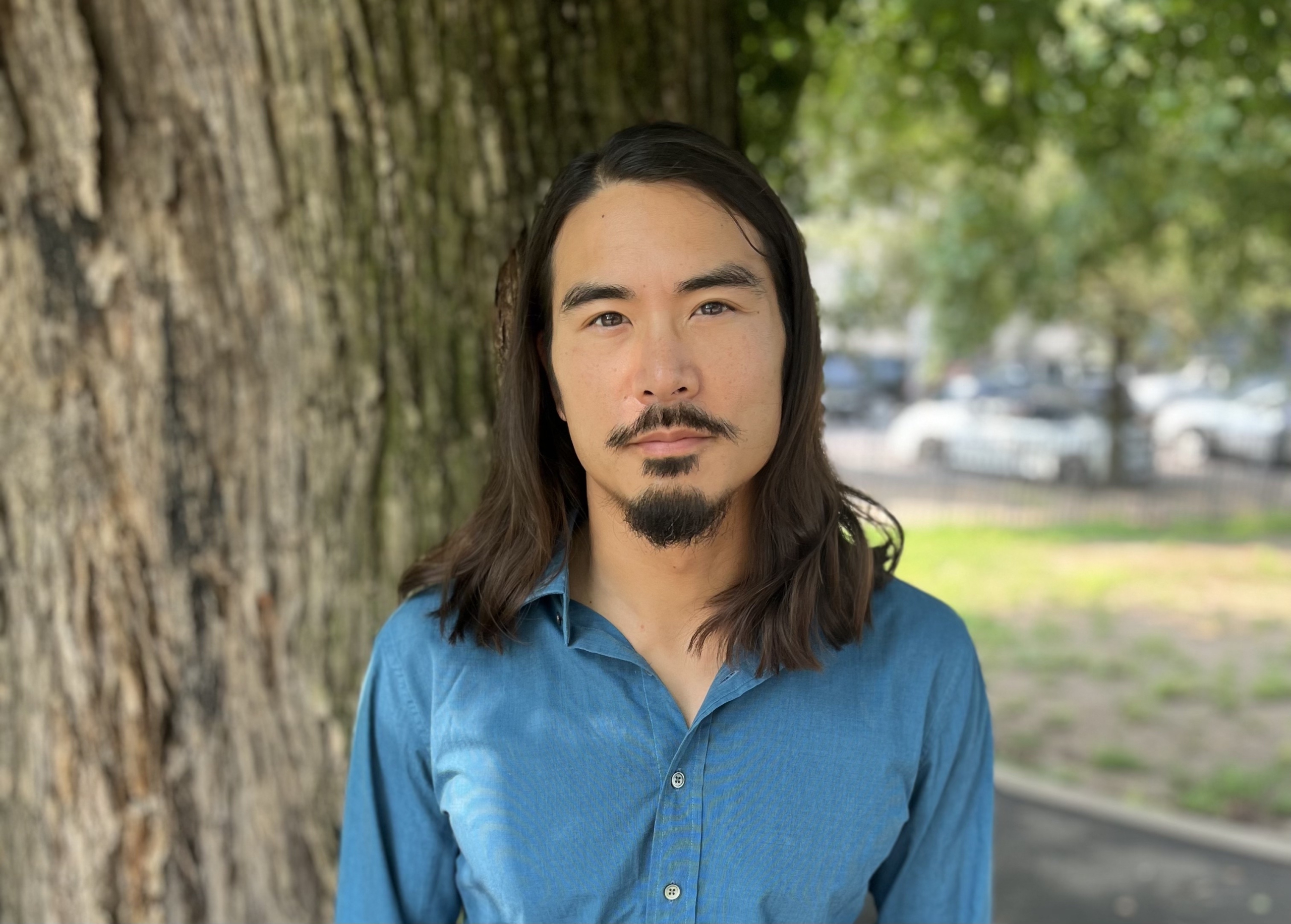
Neil Gong became interested in the challenges of mental health policy at his first job after graduating college, working with a psychiatric team helping formerly homeless people get access to housing and care in the East Harlem neighborhood of New York City.
“I saw how broken the systems were, with people ending up on the streets again or in and out of jail,” Gong says. “I’d ask the social workers and doctors: How did we go from an asylum system, like ‘One Flew Over the Cuckoo’s Nest,’ to this non-functional community system?”
Such questions led Gong to the sociology doctoral program at UCLA, where he began writing his first book, “Sons, Daughters, and Sidewalk Psychotics: Mental Illness and Homelessness in Los Angeles,” published by University of Chicago Press in 2024.
In the book, Gong, now an associate professor at UC San Diego, explores two distinct venues of mental health care in America. First, he shadowed mental health care providers as well as nonprofit and government outreach workers on the Skid Row streets of downtown Los Angeles. Next, he went looking for a better-resourced mental health system to compare it to — and found one just across town, in tony West L.A. and Malibu.
He finds private mental health clinics to be far more attentive, thanks to better funding and staffing. But he also notes key pitfalls, including a lack of patient autonomy, with the frequent perception that patients’ families are paying to micromanage and enforce a normative vision of recovery. On the other hand, patient autonomy is considerably greater in the Downtown L.A. system, but the emphasis on self-determination—especially in a resource poor context—can become a kind of neglect. He calls the approach “tolerant containment.”
“They’re trying to minimize the problems that patients create, and minimize costs,” Gong says of housing-first public safety net programs. “There’s a way in which you can say it’s successful, but it’s really lacking this next step of helping people achieve some semblance of their dreams.”
Gong’s book suggests a better system, focused on quality of care over bare metrics like numbers of beds added. As for forced treatment, which he believes is coming, he says, “It could be a dungeon, like the worst parts of the old asylum system. But it could also be done well.”
To achieve that, he argues, we must invest seriously in life-improvement outcomes. One way we can do so strategically, he adds, is by designing systems with input from the patients themselves.
Chloe Fuson ’24

When Chloe Fuson was a kid growing up in Long Beach, her parents — both Bruin alumni — would every so often drive her up to Westwood for a basketball game and a walk around campus. On one trip, they found their way to the UCLA Mathias Botanical Garden, sparking a lifelong fascination.
“It was a cool space that stuck with me,” Fuson says. “It became a thing with my family. When we’d go on vacations, if we were in a city with a botanical garden, we’d visit.”
By the time she was applying for colleges, Fuson knew she wanted to study environmental science, but only once she’d started at UCLA did she discover her dream specialty — conservation biology. The best thing about it was that it allowed her to spend time at the Mathias Botanical Garden as part of her undergraduate path.
The summer before her senior year, after years of volunteering, Fuson worked at the garden, filing and sorting the collections of plant specimens like pressed leaves and flowers. There, she had an “aha” moment that kicked off an original research project.
“I had read an article about the relevance of historic specimens to understanding changes in plants over time,” Fuson explains. “I was like, ‘Hey, I’ve been pulling all these specimens that are from the Mathias Botanical Garden, but they’re many decades old. I wonder if any of these are still here?’”
Working with Anthony Baniaga, the Herbarium curator at the Botanical Garden, Fuson was eventually able to identify four different plants currently in the garden with samples in the collection stretching back decades. Fuson was then able to demonstrate that, over time, these plants had developed increased density of stoma, leaf features which regulate photosynthesis and have a strong linkage to climate variables.
Fuson went on to complete her master’s at Queen Mary University of London, where her research at the Royal Botanic Gardens, Kew found her studying climatic adaptation of date palm trees using living and historic herbarium specimens.
And now, she has accepted a position at the Santa Barbara Botanic Garden, where she will be working to conserve rare California flora.
“This position will be an amazing opportunity to apply the experience I have gained through my years in academia and make an impact in protecting California’s beautiful and unique nature,” she says.
Caro De Robertis ’96
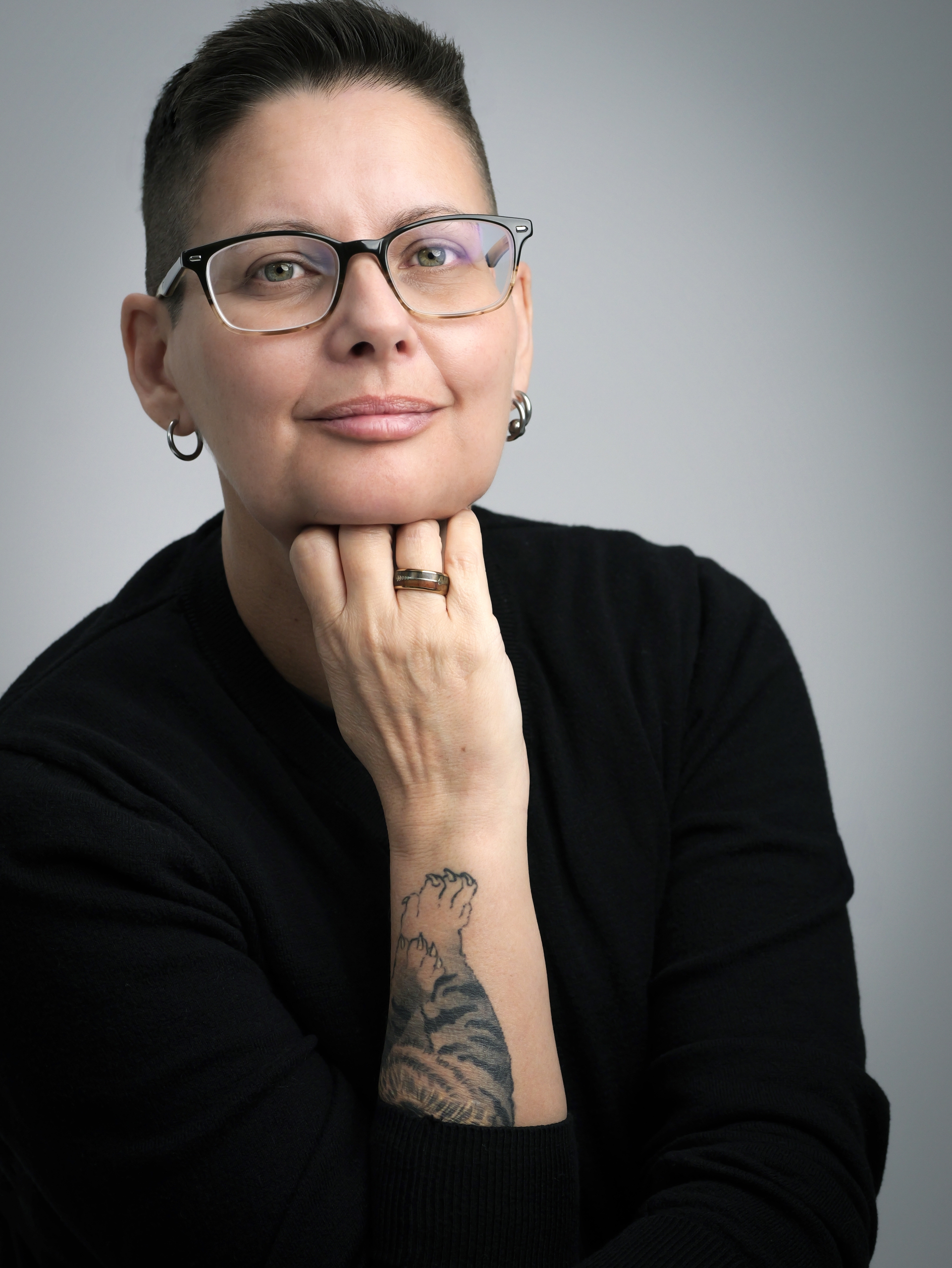
Irene Young
Caro De Robertis is the celebrated author of six novels, including two Stonewall Book Award winners, “Cantoras” and “The Gods of Tango.” With their latest book, “SO MANY STARS: An Oral History of Trans, Nonbinary, Genderqueer, and Two-Spirit People of Color,” De Robertis takes on a new role — that of steward of the real-life stories of pathbreaking LGBTQ+ elders.
“Trans and gender-nonconforming people have always existed, in every time of history, in every culture all over the world, but our stories are underrepresented,” says De Robertis. “Our voices are systemically erased, so preserving stories feels profoundly important.”
De Robertis came to the project when they were awarded a fellowship by the Baldwin-Emerson Elders Project, an oral history effort housed at Columbia University and founded by MacArthur “genius” grantee Jacqueline Woodson. De Robertis’s assignment was to interview elderly LGBTQ+ people of color on the U.S. West Coast. As they collected raw material for the archival project, De Robertis began to imagine how it might fit together as a book, with a focus on trans and gender nonconforming elders, and with each interview thoughtfully edited for narrative arc and cumulative impact.
“I have a passion for giving voice to silenced stories of culture that has run through all of my creative work,” De Robertis says. “This does feel very much like a continuation of that passion — which is one that was awakened in the UCLA classroom.”
De Robertis had not yet decided to become a writer — or even come out of the closet — when, at age 19, they took UCLA professor Arthur Little’s seminar in gay and lesbian literature. Of Uruguayan background, De Robertis especially appreciated that Little built his syllabus around writers of color.
De Robertis’s favorite moments in the new book tend to revolve around the idea of chosen family, including sweet stories of community told by Black trans activist Sharyn Grayson and by Indigenous drag queen Landa Lakes. De Robertis was disowned by their own parents, who have still never met De Robertis’ teenage children, so they find such anecdotes especially affecting and empowering.
“It makes me sort of laugh and want to cry at the same time, every time I sift through the book,” De Robertis says.
Grant McCurdy ’18
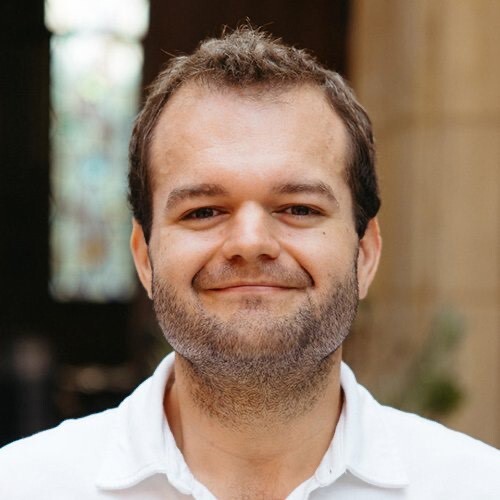
When the COVID-19 pandemic hit, Grant McCurdy was home on winter break from his job teaching math at an international school near Wuhan, China. Unable to return to work, he took the pandemic as a chance to turn his technological savvy to entrepreneurial ends.
“It was an opportunity to try to launch my own thing, bootstrap a little organization,” he says. “One of the lessons was that it’s actually not that hard to start a business.”
McCurdy’s company, Logos Education Group, focused on providing Canvas course cartridges and other e-learning services to international schools across China and the United Arab Emirates. Business wound down as lockdowns ended, but McCurdy has kept on the cutting edge of technology in education. These days, in his new job as the head of the math department at Pacifica Christian High School, he is putting his entrepreneurial energy toward bringing the school’s math offerings into the AI era.
“I’ve always tried to leverage technology to do the best job that I can,” he explains. “It has evolved, from early on in my career experimenting with Google Sheets to now incorporating AI. That’s been my track in terms of how I approach my work — trying to use all the tools at my disposal.”
In particular, McCurdy says, large language model agents like ChatGPT have proven valuable in helping him generate an endless supply of problem sets, which can be specifically tailored to students’ individual needs.
He cautions, however, that student use of AI also carries pedagogical risks, which he is strategic in circumventing.
“Due to these technologies, homework is pretty much a useless metric at this point,” he says. “In my department, in the actual classroom, we’re old-school: pencil and paper, students taking notes, paying attention.”
On the other hand, he is thrilled by the impact of lesson-planning AI on student outcomes. For example, in his first year teaching Advanced Placement statistics, his students’ pass rate on the standardized test was under 50%. The next year, after ChatGPT came out and he began using it to develop problem sets, his class’ pass rate “shot up” to 72%.
“It completely changed the game,” McCurdy says. The job ahead, he says, is to help the rest of his department achieve similarly transformative results.
Marian Gabra Ph.D. ’10
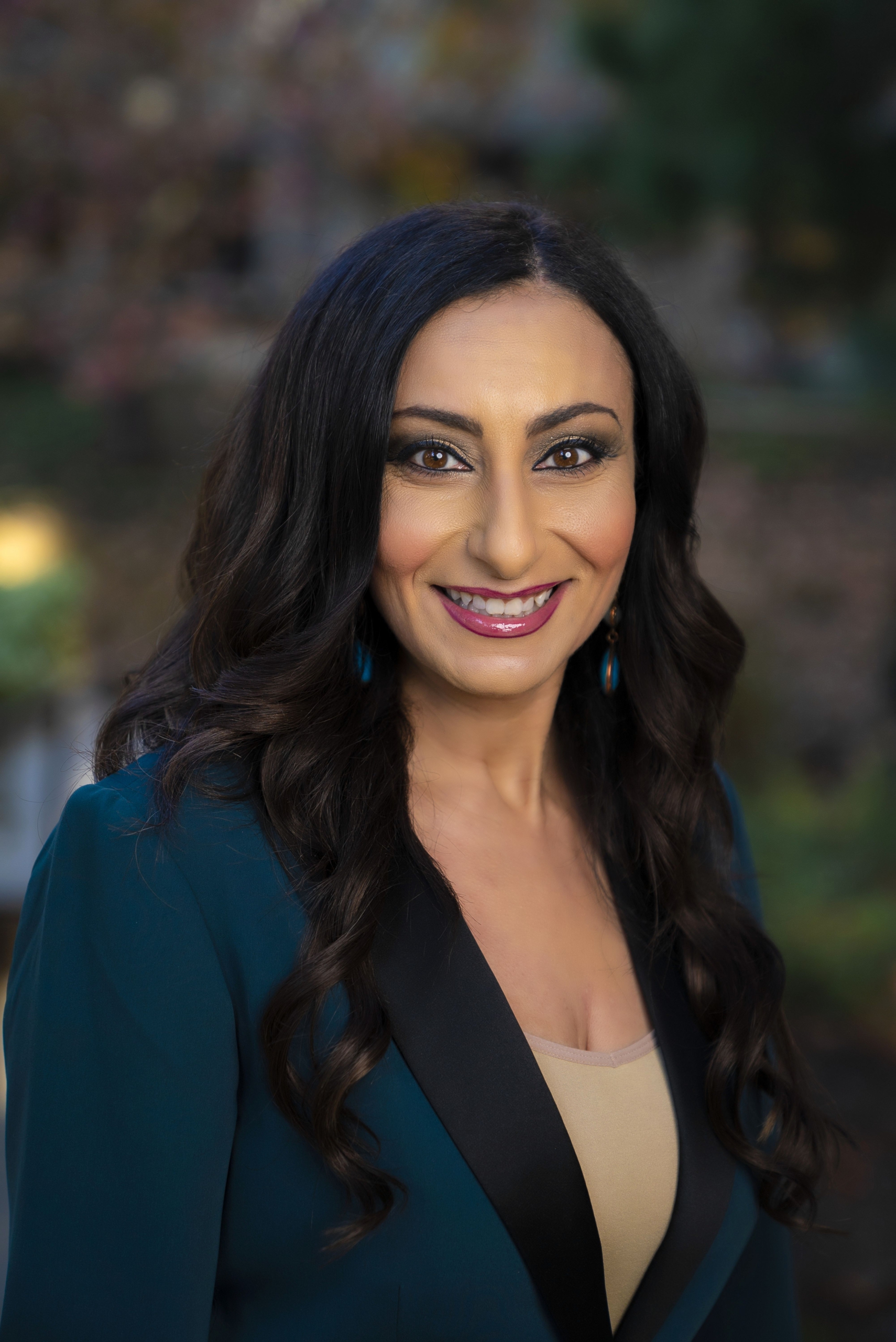
While earning her doctorate in comparative literature at UCLA — and later as a lecturer in the same department — Marian Gabra often came across students who needed help navigating the university and making the most of its potential to change their lives. The need was especially acute among those with fewer family resources.
“Because I was a first-generation college student myself, I found that students were really opening up to me,” Gabra says. “I wanted to help, but I didn’t fully know then how to support undergraduate students outside of the classroom.”
Eventually, Gabra discovered UCLA’s academic advising program and the complex field of academic advising — and before long, she had become an advisor herself.
“I was just in awe of how much of an impact that advisors make, as the cultural navigators for students in their education,” she says.
Today, Gabra is senior director for learning and development and strategic partnerships at the Center for Academic Advising in the College. There, in addition to working one-on-one with students, she oversees training and professional development for advisors, as well as supervising and teaching courses in the University Studies Program that support students understand the hidden curriculum of UCLA so they may maximize their journey with intention.
“I feel like I’m living my purpose,” Gabra says. “Being able to see the impact of my work on a daily basis is really rewarding and validating.”
For example, this year, Gabra got to see a student graduate whom she’d first met in 2017. The student was housing insecure and had been raised by a grandmother while both parents were system impacted. The student was academically dismissed from UCLA at one point, but, with Gabra’s support and connections to campus resources, she returned to complete her degree this summer 2025.
Perhaps Gabra’s proudest accomplishment is the culture she’s helped build at the advising center. She points out that other UC campuses now look to UCLA as model of how to develop and implement centralized training and development programs for advisors. In 2018, the Advising Communities of Excellence (ACE) Professional Development Program that she created and leads won an award for advising innovation from the National Academic Advising Association. That spirit of innovation is necessary, Gabra notes, with only 14 advisors for 21,000 undergraduate students — well below the 250:1 ratio recommended by NACADA.
“We do believe that to really support students fully, we need to first support our staff,” Gabra says. “There is a lot to be really proud of and grateful for.”


